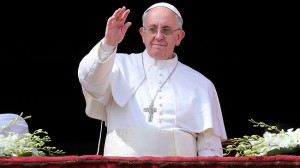Mom and Teen Disagree About Pope’s Message
 Q. Pope Francis’ recent comments about gays — meant to be loving and conciliatory — have unfortunately created tension in my home. My teenager believes his comment, “Who am I to judge?” means that we should accept homosexuality as a normal occurrence and, therefore, something we shouldn’t reject. I’m certain that’s not what the pope meant — or if he did, I’m worried that the church is backing down on this important doctrine. Did the pope articulate a new teaching on homosexuality?
Q. Pope Francis’ recent comments about gays — meant to be loving and conciliatory — have unfortunately created tension in my home. My teenager believes his comment, “Who am I to judge?” means that we should accept homosexuality as a normal occurrence and, therefore, something we shouldn’t reject. I’m certain that’s not what the pope meant — or if he did, I’m worried that the church is backing down on this important doctrine. Did the pope articulate a new teaching on homosexuality?
A. I love this pope. He is completely unafraid to answer the hard questions and speak the truth, and he even thanked the reporter who asked this question for giving him the chance to address this subject. How cool is that?
Francis spoke very clearly but he is also a sophisticated and intellectual man, so we’re charged with making sure that we really understand what he said, and what he meant.
First, the question wasn’t just a random inquiry about the pope’s understanding of homosexuality. The question was, “How should one deal with this question and how does your holiness wish to deal with the whole question of the gay lobby?”
Essentially, it was a political question about a faction of leaders in the Vatican who are or were known to lobby on behalf of the interests of gay priests.
So, to be clear, Francis wasn’t asked the question, “How do you feel about gays?” Nonetheless, he answered that very question so he could articulate the church’s unchanged and unchanging teaching about gays and same-sex attraction.
“If a person is gay and seeks the Lord and has good will, who am I to judge that person?” Francis said. That statement, if taken out of context, might lead your teenager to believe that the pope is reflecting a “new” position about homosexuality. But there’s actually nothing “new” about loving others, especially those who experience the pain of sin.
Francis went on to say this: “The Catechism of the Catholic Church explains this point beautifully but says, wait a moment, how does it say, it says, these persons must never be marginalized and ‘they must be integrated into society.’”
The Holy Father makes it clear that rejecting or reviling people for the fact of their same-sex attraction is not the way the church responds to gays, even though the church recognizes homosexual behavior as sinful.
Meanwhile, back at the news conference, the question to the pope from the reporter had to do with power struggles within the Vatican, widely referred to as a “gay lobby” within the leadership.
Here’s what he said about that issue: “The problem is not that one has this tendency; no, we must be brothers, this is the first matter. There is another problem, another one: The problem is to form a lobby of those who have this tendency, a lobby of the greedy people, a lobby of politicians, a lobby of Masons, so many lobbies. This is the most serious problem for me. And thank you so much for doing this question. Thank you very much.”
As for your teenager, I’m not at all surprised by the assumption that Francis is articulating some new teaching about gays. First, the media generally hone in on this topic with freakish interest when it comes to dogma of the Catholic Church. Many uninformed folks with access to microphones and websites actually believe that a pope is free to change the teachings of the church, much like a president enacts new public policy.
But the teaching that Francis reiterated is the same as it ever was: we’re called to love everyone, and since we’re all sinners, that means loving sinners. Gay behavior is sinful (as is all sexual behavior that isn’t in the context of marriage), but as with all sins, a willingness to repent and live according to God’s plan is all it takes to get on the right road.
Redemption is available to everybody, since Jesus already did the heavy lifting for us.

